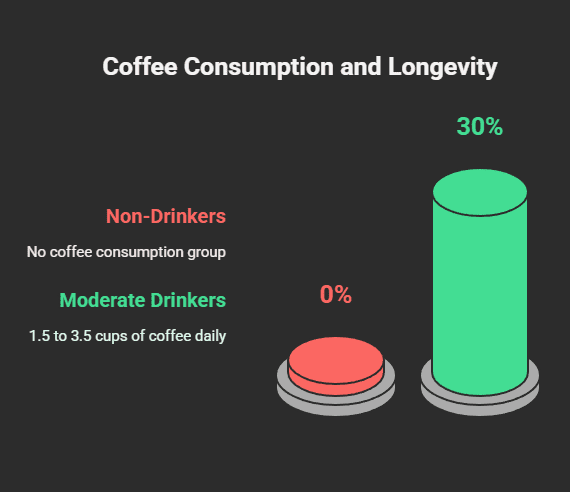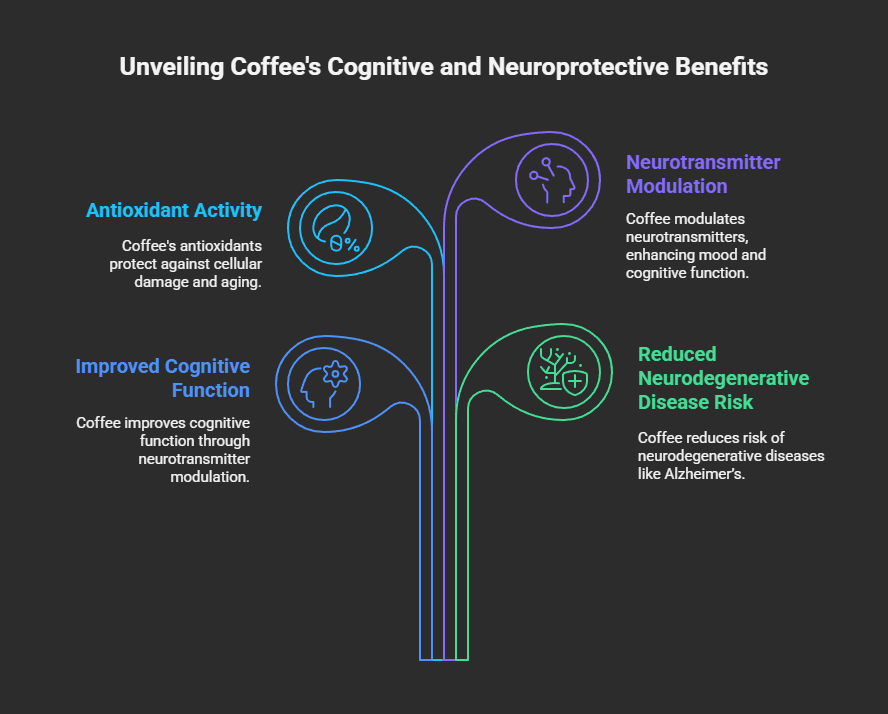Coffee is more than a morning tradition, it could also be the secret to a longer, healthier life. Recent research indicates that coffee consumption contributes to living longer, due to its high concentration of antioxidants and other healthy compounds. Moderate coffee drinking has been associated with lower risks of chronic diseases and even mortality in black, decaf, or with a little milk.
How Drinking Coffee Keeps You Alive Longer

Several large-scale studies have identified a strong correlation between coffee drinking and longevity. For example, a 2022 study in the Annals of Internal Medicine used data from more than 170,000 UK participants and reported that those who consumed 1.5 to 3.5 cups of coffee per day were up to 30% less likely to die throughout the study compared with non-drinkers.
Likewise, Harvard scientists noted that drinking three to five cups of coffee daily reduced mortality from type 2 diabetes, cardiovascular disease, and neurological disorders. These effects were observed whether the coffee was caffeinated or decaf, indicating that substances other than caffeine are responsible for these benefits.
The Science Behind Coffee’s Health Benefits
Coffee contains antioxidants like chlorogenic acid that fight oxidative stress, a process involved in aging and disease. These antioxidants can decrease inflammation and increase insulin sensitivity, hence reducing the risk of type 2 diabetes and cardiovascular disease.
Besides that, coffee is rich in polyphenols and other bioactive molecules that might guard against certain cancers and assist with liver well-being. The complicated chemical structure of the beverage adds to the possibility of promoting longevity.
Coffee and Heart Health
Moderate coffee intake has been linked to a lower risk of heart disease. Drinking two to three cups of coffee per day has been found, according to a study in the European Journal of Preventive Cardiology, to be associated with a 20% lower risk of cardiovascular disease.
The research further pointed out that both caffeinated and decaffeinated coffee beans were responsible for this advantage, suggesting that something other than caffeine is responsible for heart health.
Effects of Coffee on Brain Health

Regular consumption of coffee can also improve cognitive function and lower the chances of neurodegenerative disease. Research has shown that those who consume coffee have less of a chance of developing neurodegenerative diseases such as Alzheimer’s and Parkinson’s diseases.
Healthline
The neuroprotective actions are believed to be due to the antioxidant activity of coffee and its capacity to modulate neurotransmitter function, improving mood and cognitive function.
Coffee and Type 2 Diabetes
Several studies have identified coffee consumption as being associated with a reduced risk of type 2 diabetes. The antioxidants and anti-inflammatory compounds in the beverage can enhance insulin sensitivity and glucose metabolism.
Both caffeinated and decaf coffee seem to confer this protective benefit, so adding it to a diabetes-preventive diet could be a valuable choice.
Coffee and Mental Health
In addition to physical health, coffee can have a positive effect on mental well-being. Scientific studies show that moderate coffee use is linked to a reduced chance of depression and can improve mood overall.
The caffeine in coffee is a weak antidepressant because it enhances the synthesis of neurotransmitters such as serotonin and dopamine, which are associated with mood control.
Coffee’s Role in Healthy Aging
One recent study that had participants above age 55 showed that having two to three cups of coffee every day was linked to a 64% reduction in frailty risk. Frailty is linked with an increased risk of falls and decreased recovery from disease or injury. The coffee’s antioxidants might be responsible for maintaining muscle strength and overall vigor among older individuals.
How Much Coffee Is Optimal?
Although coffee has numerous health benefits, moderation is vital. Most studies show that drinking between two and five cups daily results in the largest health benefits. Drinking more can cause adverse reactions like insomnia, jitteriness, or an elevated heart rate.
It’s also crucial to consider how coffee is prepared. Filtered coffee is usually a better choice than unfiltered types, such as French press, because it eliminates substances that can increase cholesterol.
What Not to Do in Your Coffee
To get the maximum health benefits from coffee, it is recommended to restrict the use of sugar, cream, and flavored syrups, which provide extra calories and cancel out some of the beneficial effects. Drinking black coffee or adding small quantities of milk or natural sweeteners can keep its health-promoting attributes intact.
Conclusion: Adopting Coffee for a Healthier Life
Adding a moderate intake of coffee to your daily life can be an enjoyable and healthy habit. From lowering the risk of chronic conditions to aiding in physical and mental well-being, coffee is more than a soothing drink, it could be a useful tool for fostering longevity.









Moderate level of cofee is really helpful, but too much coffee is increasing my stress level